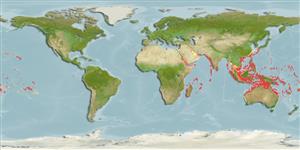Common names from other countries
Environment: milieu / climate zone / depth range / distribution range
Ecologie
marien rifbewoner; diepte 3 - 60 m (Ref. 1602), usually 5 - 50 m (Ref. 27115). Tropical; 24°C - 28°C (Ref. 27115); 32°N - 35°S, 24°E - 132°W
Indo-Pacific: Red Sea and East Africa to Samoa and the Tuamoto Islands, north to southern Japan.
Grootte / Gewicht / Leeftijd
Maturity: Lm ? range ? - ? cm
Max length : 22.0 cm TL mannelijk / geslacht onbekend; (Ref. 4392)
Dorsale stekels (totaal): 9; Dorsale zachte stralen (totaal): 11-13; Anale stekels 3; Anale zachte stralen: 11 - 13. Ground color of female very dark brown; orangish on front of head and lower parts; body spotted with white or very pale yellow, extending to dorsal and anal fins; caudal bright cadmium. Male form deep violet; irregular blue spots on cheeks and lower operculum; body with round blue spots becoming oblong, nearly forming longitudinal bands ventrally; dorsal and anal fins with longitudinal bands; caudal with numerous blue ocelli. Dorsal spines flexible. Caudal fin of adults truncate to emarginate; rounded in small juveniles. Easily confused with male A. geographicus when seen underwater, except when displaying with iridescent blue-green lines and spots over the body and fins (Ref. 48636).
Adults are found in areas of mixed coral, rubble, consolidated limestone, and sand of seaward reefs; also in soft coral or sponge habitats (Ref. 48636). Oviparous, distinct pairing during breeding (Ref. 205). Minimum depth reported taken from Ref. 30874.
Levenscyclus en paargedrag
Maturiteit | Voortplanting | Paaien | Eieren | Fecunditeit | Larven
Oviparous, distinct pairing during breeding (Ref. 205).
Randall, J.E., 1972. A revision of the labrid fish genus Anampses. Micronesica 8(1-2):151-190. (Ref. 2677)
Status op de Rode Lijst van het IUCN (Ref. 130435)
CITES (Ref. 128078)
Not Evaluated
Gevaar voor de mens
Harmless
Gebruik door de mens
Visserij: van minder commercieel belang; Aquarium: Commercieel
Meer informatie
ReferentiesAquacultuurAquacultuurprofielKweeklijnenGeneticaElectrophoresesErfelijkheidZiektesVerwerkingMassaconversie
Tools
Speciale rapporten
Download XML
Internetbronnen
Estimates based on models
Preferred temperature (Ref.
115969): 24.3 - 29, mean 27.6 (based on 1474 cells).
Fylogenetische diversiteitsindex (Ref.
82804): PD
50 = 0.5002 [Uniqueness, from 0.5 = low to 2.0 = high].
Bayesian length-weight: a=0.00977 (0.00470 - 0.02030), b=3.07 (2.89 - 3.25), in cm Total Length, based on LWR estimates for this (Sub)family-body shape (Ref.
93245).
Trofisch niveau (Ref.
69278): 3.5 ±0.37 se; based on food items.
Weerstandsvermogen (Ref.
120179): Gemiddeld, minimale populatieverdubbelingstijd 1,4-4,4 jaar (Preliminary K or Fecundity.).
Fishing Vulnerability (Ref.
59153): Low vulnerability (12 of 100).
